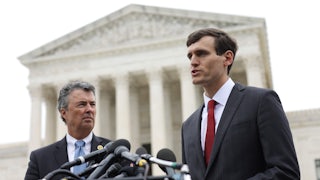The reviews are in on the president’s North American Bidenomics Tour, and it’s a flop, according to a Wall Street Journal poll of 1,500 registered voters released Monday. Fully 58 percent say the economy has gotten worse over the past two years.
That’s objectively untrue. Inflation rose to 9.1 percent in June 2022, but it fell over the past year to 3.2 percent, and by June and July, hourly wage increases exceeded inflation for the first time in two years. Unemployment is 3.8 percent, which is very low. Biden pushed through Congress a law permitting Medicare to negotiate drug prices, something Democrats (and some Republicans, including, briefly, Trump) sought, unsuccessfully, for a generation. Late last month the administration announced that the first 10 drugs had been selected for haggling. A proposed regulation from the Biden Labor Department would extend eligibility for time-and-a-half overtime pay to 3.6 million more salaried workers. The (misnamed) Inflation Reduction Act of 2022 is projected to create (according to the Bank of America) 86,000 jobs based on investments announced thus far, and the 2021 infrastructure bill is expected to create (according to Moody’s Analytics) another 660,000 jobs.
More shocking still, more voters (52 percent) agreed that former President Donald Trump “has a strong record of accomplishments” than agreed the same about Biden (40 percent).
Let’s review Trump’s accomplishments.
Trump lowered taxes on the rich through cuts in corporate and capital gains tax rates and a reduction of the top marginal tax rate for households earning in excess of half a million dollars (a threshold that has since risen to $578,100). This increased the budget deficit by somewhere between $1 trillion and $2 trillion.
At the behest of corporate lobbyists, Trump weakened or eliminated dozens of health, safety, and environmental regulations.
Trump separated children from their parents at the border, prompting an outraged public reaction that persuaded him to stop. But as of February, hundreds of children remained separated from their parents.
Trump installed an anti-abortion majority on the Supreme Court.
Trump tried (well … sort of) and failed to pass an infrastructure bill.
Trump promised to build a wall, paid for by the Mexican government, across the 1,954-mile southern border but ended up mostly just replacing existing fencing, with a net addition of 52 miles where no fencing had been before. Neither the replacement fencing nor the new fencing was paid for by the Mexican government.
Trump tried and (thankfully) failed to repeal the Affordable Care Act.
Trump tried and (thankfully) failed to enlist Ukraine’s president (“I would like you to do us a favor though”) in a partisan scheme to discredit the son of his 2020 presidential opponent, withholding U.S. aid to apply pressure.
Trump bungled management of the Covid epidemic, with the result that 400,000 people died from the disease on his watch, a much higher death rate than in other wealthy countries, none of them as wealthy as the United States. As a consequence, when Trump left office the unemployment rate was 6.3 percent (compared to the 4.8 percent rate when he entered office).
Oh, and after Trump lost the election, he tried to overturn the results, a crime for which he is now being prosecuted in two jurisdictions. Trump also encouraged rioters to block the counting of ballots in Congress by urging them to march on the Capitol and then by remaining silent, for hours, while they committed acts of violence and vandalism there. This raises some question about whether he’s eligible, under the Fourteenth Amendment, to appear on the presidential ballot in 2024.
In spite of all that, a narrow majority of voters polled by the Journal agreed that Trump had “a strong record of accomplishments” while only a minority of voters agreed that Biden had “a strong record of accomplishments.” Why the disconnect?
Because voters haven’t had time to absorb the good news, says Jim Messina, who managed President Barack Obama’s 2012 reelection. “Research shows voters’ views on the economy are baked in by June of the re-election year,” Messina writes in a new 22-slide presentation for Democrats, “meaning the White House has 9 months to change perception.” So don’t wet the bed just yet, Democrats. (“Historically, we’re fucking bedwetters,” Messina told Politico’s Playbook. True enough.)
If voters take nine months to absorb an economic trend, then they opined to the Journal’s pollsters based on the status quo as of December 2022, when inflation had just started to come down and was still driving down real wages. Myself, I was predicting in December 2022 that inflation would not be much of a problem in 2023. But I also was warning that unemployment would replace inflation as a source of concern, a prediction that, thankfully, proved wrong. But maybe voters are still bracing themselves for that recession that never came.
One knock against Messina’s “they’ll come around” advice is that tracking polls don’t provide much comfort on this point. Biden’s approval numbers, both overall and specifically on the economy, are up since May, according to the AP, but not by much. Biden’s gone from 40 percent overall approval to 42 percent; on the economy, from 33 percent approval to 36 percent. Gallup dates rising approval for Bidenomics a little earlier, from March, but the rise is a similarly poky 32 percent to 37 percent. If Biden continues at this rate, then by next June his approval rating on the economy will be 43 or 44 percent, which is still pretty anemic.
My own best guess for why voters are being stingy with Biden comes down to four factors, three of which I’ve written about before.
The first is that when you ask a voter how the economy is doing, they’re liable to translate that to “Which candidate do you prefer?” In 2016, Gallup asked voters how the economy was doing one week before the November presidential election and one week after. One week before, only 16 percent of Republicans said it was improving; one week after, 49 percent said it was improving. In the interim, Donald Trump was elected president, against all expectations, and Democratic President Barack Obama became a lame duck. It was therefore no surprise to find in July that 71 percent of Democrats approved of how Biden was handling inflation as against 5 percent of Republicans.
The second factor is that business reporters have a bias toward reporting all economic news as bad. Obvious bad news is obviously bad, but obvious good news is bad too because it risks prompting a harmful reaction by regulators (the Fed might hike interest rates) or by the market. I can’t make this point without crediting Gregg Easterbrook for writing a brilliant New Republic article on this topic 34 years ago.
The third factor is that throughout recovery from the two-month recession of 2020 (February to April), wage increases have been concentrated at the lower end. That’s a very good thing, but it leaves out a middle class whose incomes have been stagnating over the past several decades. The middle class is benefiting in other ways from the Biden economy, but not in this very tangible way.
The fourth factor is an insurance crisis brought on by climate change. Insurance companies have responded to rising claims due to proliferating hurricanes, fires, floods, and other mayhem by jacking up premiums and, when state regulators won’t allow that, withholding insurance altogether, as property insurers did recently in Florida and California. Since January 2022, no fewer than 31 states have seen double-digit increases in premiums for property insurance. It’s almost as bad with automobile insurance, the price of which is expected to rise 8.4 percent this year.
Climate-driven premium inflation is not likely to get better anytime soon. Of course, it’s self-inflicted, not only through our emission of carbon into the atmosphere but also, in the U.S., through a ridiculous governance scheme that assigns insurance regulation to individual states. Especially in a hurricane corridor like Florida’s or a wildfire-friendly landscape like much of California, leaving insurance to the states forces some of them to absorb an unreasonably large share of climate risk and its attendant costs. Unfortunately, a June report on the problem by Biden’s Treasury Department fell well short of urging that automobile and property insurance be regulated entirely by the federal government.
Even here, though, Biden outperforms Trump by a mile, merely by acknowledging that climate change is an urgent problem. “I listen to people talk about global warming, that the ocean will rise, in the next 300 years, by one-eighth of an inch—and they talk about, ‘This is our problem,’” Trump told Fox News in April. “The environmentalists talk about all this nonsense.” Even by Trump’s debauched standards, though, double-digit increases in property insurance premiums can’t be shrugged off as nonsense. Perhaps he’ll find something besides climate change (“critical race theory”?) on which to blame them, and perhaps his Republican supporters will, yet again, dream up some fanciful reason to believe him. Or perhaps they don’t need a reason. If the Journal poll tells us anything, it’s that human reason isn’t playing much of a role yet in voters’ opinions about 2024.






